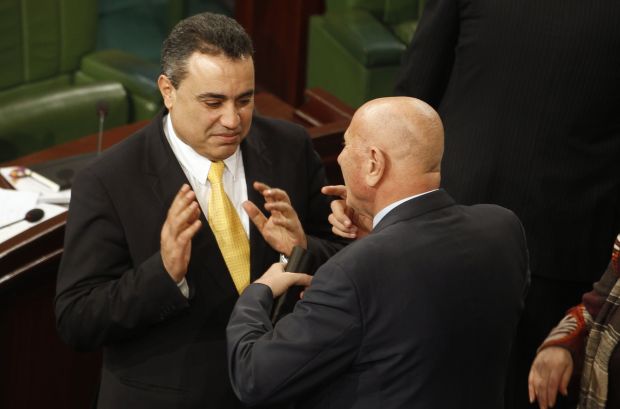
Tunisia’s prime minister-designate Mehdi Jomaa (L) speaks with Nejib Chebbi, leader of the Al-Joumhouri party, in the constituent assembly in Tunis on December 25, 2013. (REUTERS/Zoubeir Souissi)
UPDATE 16:15 GMT: PM Jomaa has been sworn in and has promised to form a cabinet “as soon as possible.”
Tunis, Asharq Al-Awsat—Prime Minister-designate Mehdi Jomaa has taken concrete steps to forming a technocratic caretaker government to oversee Tunisia until new elections can be held following Ali Laarayedh’s resignation on Thursday, Asharq Al-Awsat has learned.
Sources close to Tunisia’s prime minister-designate, speaking to Asharq Al-Awsat on the condition of anonymity, affirmed that Jomaa has taken important decisions regarding the formation of a new cabinet, with just a number of ministerial portfolios left to be filled. The technocratic government will likely include figures previously viewed as contenders to lead the caretaker government, including Bourguiba-era minister Mohamed Ennaceur, former central bank governor Mustapha Kamel Nabli, and Sebsi-era Finance Minister Jalloul Ayad.
The Tunisian sources told Asharq Al-Awsat that the Jomaa government will also include more than one female minister, while the Ministry of Women’s Affairs will likely be disbanded and its tasks assigned to other ministries.
Ali Laarayedh’s resignation on Thursday ended a months-long political crisis that had dogged Tunisia’s Ennahda-led government. Despite his resignation, Tunisian constitutional experts said that Laarayedh will remain the county’s de facto prime minister for at least ten days, until Jomaa can form a new government and present his ministers to the country’s Constituent Assembly for approval.
The Tunisian street remains restive in spite of the progress in ending the political deadlock. Protests were reported in a number of Tunisian cities, including in the northern and central provinces. In Tunisia’s southern Tataouine governorate, a large group of street vendors protested against regulations preventing them from operating, with reports that security headquarters and vehicles were set on fire.
Eyewitnesses told Asharq Al-Awsat that the scenes were reminiscent of the “Mohamed Bouazizi scenario,” in reference to the Tunisian street vendor who set himself on fire after being harassed by the security forces of the Zine El-Abidine Ben Ali government, sparking nationwide protests that led to the regime’s ouster three years ago.
There have also been demonstrations associated with a general strike in Tunisia’s western Al-Qasrayn province, with clashes between protesters and security forces reported. The strike was called by the Tunisian General Labor Union (UGTT) against a perceived “absence of social justice” during the Laarayedh administration. Earlier this week, police headquarters in a number of Tunisian cities were reported to have been vandalized and torched by anti-government protests. It remains unclear whether the protests will disperse following the resignation of Laarayedh and the ascension of a Jomaa government.
For his part, Ennahda leader Rachid Ghannouchi said that while his party was no longer in government, his party has not left power. Responding to claims that Laarayedh’s resignation was a blow to Ennahda and a victory for the Islamist movement’s opponents, he pointed to Ennahda’s strong presence in the country’s Constituent Assembly as evidence of that ongoing power. Ennahda is the largest bloc in Tunisia’s Constituent Assembly, which is functioning as the country’s parliament, having 89 of a total 217 seats.
Jomaa is a former Minister of Industry and a virtual unknown on Tunisia’s political scene. He was chosen as the consensus candidate to head a caretaker administration on December 14 after a number of more well-known political figures had been rejected.
